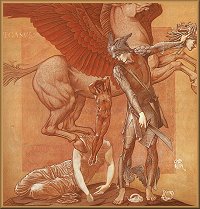
CLICK TO
ENLARGE
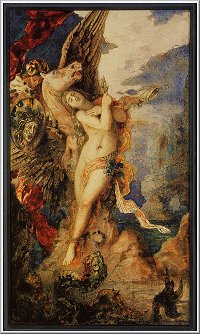
Perseus & Andromeda
by Gustave Moreau, 1869
CLICK TO ENLARGE
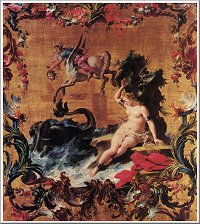
Perseus Rescuing Andromeda
by Filippo Falciatore
CLICK TO ENLARGE
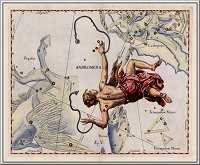
CLICK TO ENLARGE
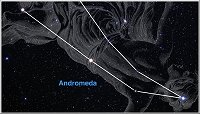
CLICK TO ENLARGE
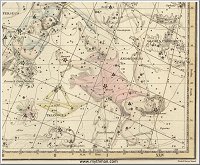
CLICK TO
ENLARGE
|
(continued from Andromeda Page One)
Many a hero had met their sudden demise at Medusa's stare, and
their petrified corpses littered her stinky lair, but Perseus
did not really care - he had
divine help.
Armed with a helmet of invisibility loaned to him by his
benefactor Hermes -
property of Hades the god of the Underworld - and with Athena's
mirrored shield and the golden winged sandals of Hermes himself, Perseus was
able to approach Medusa without meeting her gaze.
He looked at the monster indirectly as it reflected off Athena's
shield, thus avoiding getting stoned. :)
Medusa never saw it coming!
With a mighty swift swipe from the magic sword provided by
Hephaestus, the god of smiths, the hero sliced off the head of
the monster. From its severed neck emerged triumphant the winged
horse Pegasus, a beautiful creature quite unlike its mother, as
well as Chrysaor, a giant wielding a golden sword.
Perseus carefully deposited the severed head of Medusa inside a
pouch and mounted the willing Pegasus for the trip back home.
That's when he spotted the damsel in distress, a distraught
Andromeda screaming in terror as the sea monster approached her
with evil intent.
The poor girl must have presented an astonishing sight as he flew overhead:
Semi-delirious, nearly nude from the buffeting of the waves,
chained helpless to a huge rock as she was about to be devoured,
nevertheless Perseus had never before beheld anyone so lovely or
fragile-looking.
Looks like a task custom-made for a Greek hero!
Perseus donned Hades' helmet of invisibility, rendering himself
and Pegasus invisible to the sea monster. Then he extracted Medusa's severed
head from the sack at his side, taking utmost care to avoid its
deadly stare.
Even in death, the hideous head of Medusa was capable of petrifying all
that gazed upon it.
Perseus did a fly-by near the sea monster, circling and calling
out to the enraged
beast in order to distract it away from the chained maiden.
Poor delirious Andromeda, also unable to see Perseus, had no
clue what was happening; all she knew was that the horrific
monster had suddenly lost interest in her! Go away! Go away!
Perseus circled unseen closer and closer, mocking the beast, and just as Cetus blindly lunged at
him, so near that its foul breath nearly knocked him out, the Greek hero brandished Medusa's head at it.
Here's looking at you, Cetus!
Just one look, a mere glimpse, that's all it took!
At once the sea monster Cetus turned to stone, and the fair
maiden, not to mention the land of Ethiopia, was saved. Poseidon
acknowledged the deed by forgiving Cassiopeia, certain that the
lesson in hubris had been learned. It had.
Good times returned. The people partied.
Perseus was offered the hand of Andromeda by her grateful
parents, and they even tried to coax him to stay and become king
of their land, further enticing him by offering to give him all
of their wealth and
worldly possessions.
Perseus was more than happy to accept the offer of the stunning
beauty as wife, and needless to say Andromeda was delighted,
not only to miraculously still be alive, but to be rescued by such a handsome,
gallant, brave and well-connected demi-god such as Perseus.
Did you say he's a son of Zeus? Good god have mercy!
And just check out his ride! An one-of-a-kind flying horse!
Oh my, she thought..What a catch!
The two eagerly agreed to be married, even though the maiden had previously been promised in
marriage to her
uncle Phineus.
That didn't sit well with Phineus, the ungrateful oaf, who most
conveniently forgot that all would have been lost had Perseus not saved
the day!
The fact that he was three times as old as her, and Andromeda
was his niece, didn't deter Phineus in the least. The girl was
his, and that was that! It had been promised when she was a baby!
At the magnificent royal wedding of Perseus and
Andromeda, a quarrel took place
between the rivals during the reception and, to make a long myth short, a drunken Phineus was promptly turned to stone by
the sight of the Gorgon's head.
People cheered. Uncle Phineus was a real jerk, disliked by all.
Perseus was determined to return home, so he carried off
Andromeda as his wife, mounted on the flying steed Pegasus. The entire
kingdom gathered to bid their savior fond farewell, sad that he
chose not to stay and become their king.
Andromeda happily and faithfully followed her husband, first to
his native island of Serifos, where he rescued his beloved
captive mother Danaë, and then to Tiryns in Argos.
Together, they became the ancestors of the family of the
Perseidae through the genealogical line of their son Perses.
Perseus and Andromeda had seven sons: Perses, Alcaeus, Heleus,
Mestor, Sthenelus, Electryon and Cynurus. The also had two daughters: Autochthe and Gorgophone
('Gorgon-slayer').
Their descendants ruled the land of Mycenae, and the line would also
include the greatest hero that ever lived, Hercules. According to
mythology, Perseus and Andromeda are the original ancestors of the
race of Persians, the modern day Iranians..
After Andromeda's death, the great goddess Athena as a memorial
placed her among the constellations in the northern sky, near
her beloved Perseus and Cassiopeia. The constellation Andromeda, so known
since antiquity, is named after her.
The Greek spelling of her name is:
Ἀνδρομέδα (Androméda) or Ἀνδρομέδη (Andromédē)
Andromeda's name translates to "ruler of men". |









